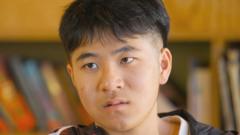Zhang Junjie, a 17-year-old university student in China, recently found himself involuntarily committed to a psychiatric hospital after he dared to protest against his country's government. His story reflects a disturbing trend where dissenting voices are silenced through mental health interventions, a practice that has resurfaced despite previous attempts at legislative reform.
The BBC unearthed numerous accounts similar to Junjie’s, where individuals became victims of forced hospitalization following protests or complaints against the authorities. Reports indicate that many were administered anti-psychotic drugs and some endured electroconvulsive therapy (ECT) without consent.
Zhang Junjie's ordeal began in 2022, at the height of stringent Covid-19 lockdowns in China. After participating in a protest, university officials notified his father, who subsequently contacted law enforcement. The following day, on his 18th birthday, he was deceived into believing he was going for a Covid test, only to be taken to a psychiatric facility instead. "The doctors told me I had a very serious mental disease… Then they tied me to a bed,” he recounted. For 12 days, he was subjected to intensive medication, restraint, and psychological torment.
After being released, Junjie defied a fireworks ban during Chinese New Year, resulting in another arrest. Once again, Junjie was hospitalized, this time for over two months under dubious charges of "picking quarrels and troublemaking." Now residing in New Zealand, he relives the trauma left by his experiences under China's stringent regime.
Despite the existence of the 2013 Mental Health Law, which was designed to protect individuals from involuntary treatment, reports show that the misuse of mental health provisions has escalated. Legal expert Huang Xuetao critiques the waning of civil oversight, noting that the lack of accountability makes it easier for police to exploit mental health laws, subjecting individuals to enforced treatments without recourse.
Another individual, activist Jie Lijian, also faced coercive treatments after protesting for better wages. He describes his frightening experience being confined to a psychiatric hospital, receiving unwanted medication and even experiencing ECT. "The pain was from head to toe... I felt like I was dying," he recalled of the traumatic therapy, from which he emerged severely affected.
An undercover investigation by the BBC further revealed that multiple hospitals acknowledge a 'troublemaker' admission category, utilized to institutionalize individuals based on political views rather than mental health concerns. Despite guidelines recommending consent for ECT, abuses continue under clandestine auspices.
The experiences of Zhang Junjie and Jie Lijian are not isolated cases. The BBC documented 59 individuals coerced into psychiatric facilities after expressing dissent. Furthermore, a growing number of people are failing to seek justice against this systemic abuse, with many court cases being dismissed or inadequately handled due to political influences.
As this issue gains visibility, the case of vlogger Li Yixue has surfaced. Following allegations of police misconduct, her social media posts went viral, but she faced subsequent hospitalization and monitoring, highlighting the ongoing struggle at the intersection of mental health and civil rights in China.
The Chinese government has publicly reaffirmed its commitment to enhancing legal frameworks against unlawful detentions. However, the gap between policy and practice remains significant, as power dynamics and local authorities continue to favor coercion over genuine adherence to the law.



















